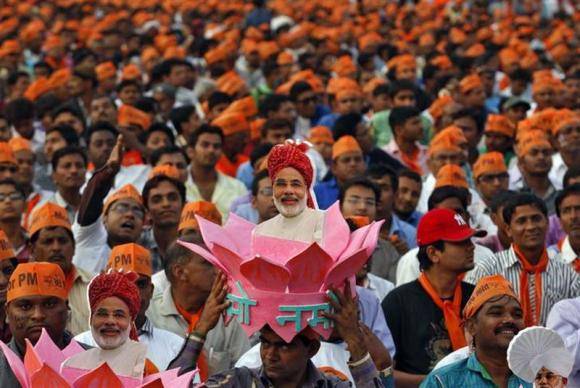Narendra Modi appeared on course to become the next prime minister on Friday, with an opinion poll showing his Hindu nationalist party maintaining a strong lead ahead of a general election that begins next week.
Modi's Bharatiya Janata Party (BJP) has benefited from a wave of public anger over corruption scandals and a slowing economy under the ruling Congress, which may be facing one of its weakest-ever showings at the polls. The BJP is expected to win 35 percent of votes, a poll published by CNN-IBN and Lokniti at the Centre for the Study of Developing Societies (CSDS) showed, 1 percent higher than a similar poll in January.
Congress is likely to claim 25 percent of the vote, down from 27 percent in the January poll, according to the last major survey before the election. Voting in the world's most populous democracy, where about 815 million people are expected to cast their votes, is phased over several weeks, ending on May 12. Results are due to be announced on May 16.
The polls have repeatedly suggested the BJP will emerge as the largest single party in the 543-seat Lok Sabha, but it is unlikely to win an outright majority and is seen forming a coalition government. The BJP has promised to kick-start the economy, bring in factories, and educate the densely populated and still-poor heartland states of India.
The survey suggested the BJP and its allies would win 38 percent of votes, giving them between 234 and 246 seats in the assembly. To form a government they would need a minimum of 272 seats forcing them to stitch up the remainder post the elections by forming alliances with other regional parties.
Congress and its allies are likely to get 28 percent of votes, translating into 111 to 123 seats.
Polls have consistently shown voters favouring Modi, a divisive but charismatic figure, to lead the country. Rahul Gandhi, the political heir of the Nehru-Gandhi dynasty appointed to lead the Congress campaign, has in contrast struggled to gather support among voters.
Family, friends and others put the rise of Modi, the son of a tea stall owner, down to his ambition, his eye for opponents' weaknesses and his grasp of economic management. But his critics speak of an authoritarian who at times rides roughshod over the democratic process and espouses moderation while concealing sectarian tendencies that could alienate the large Muslim minority.
The BJP and its allies are forecast to claim 36 percent of the popular vote in Uttar Pradesh, which as India's most populous state offers the largest number of parliamentary seats, a CNN-IBN-Lokniti poll published on Thursday showed.
Elsewhere, the BJP and its partners are predicted to perform well in Rajasthan and Maharashtra, where they may get 55 and 43 percent of the vote respectively and the largest number of seats, according to two CNN-IBN-Lokniti polls. Elections in India's sprawling democracy are notoriously difficult to predict, however, and translating vote share into actual seats won is not always reliable.






